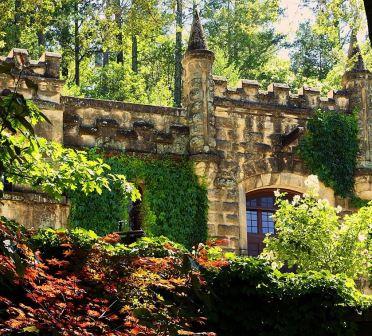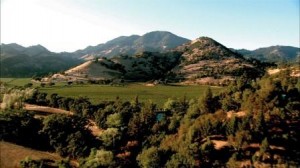1995 Chateau Montelena Cabernet Sauvignon The Montelena Estate Napa Valley California USA Wine Tasting Note
9201 Views
|
1995
According to my last note, from 5 years ago, the wine showed a marked green streak. I had forgotten all about it. Popped and poured, that is still the overriding characteristic. The wine is concentrated, big and with loads of fruit, earth and tobacco, but the green streak paints a wide swath down the middle of your palate. Those who long for old school Cabernet, when pyrazines were a big part of the picture will probably love it. 4,990 Views Tasted Feb 26, 2020Fresh, ripe cherries and cassis in the aromatics, bright, crisp, fresh with a distinctive herbal, green pepper tint on the palate. 4,211 Views Tasted Dec 9, 2015 |


Everything about Chateau Montelena Napa Valley California Cabernet Sauvignon, Chardonnay wine producer profile, wine tasting notes, wine and food pairing tips, best vintages, history of the property, information on their wine making techniques, terroir and soil. You can also read about the Grapes used for California wine and learn about the extensive History of Napa Valley, California Wines
Chateau Montelena History, Overview
Chateau Montelena has a long history dating back to 1882. That was the year when Alfred L. Tubbs purchased 254 acres of land in the Calistoga appellation of the Napa valley. Tubbs set to work planting the vines for the purpose of creating his American version of a French chateau that would be right at home in the Bordeaux. Alfred Tubbs was so enamored with French wine, he hired a French wine maker and brought him to America to help produce Chateau Montelena wines.
Montelena became tremendously popular. With its new found fame and wealth, the estate continued expanding until it became the 7th largest winery in Napa by the start of the 20th century. Things continued improving until Prohibition caused all wine making and consumption in America to grind to a halt. Once the Volstead act was repealed, it took decades for the California wine industry to get back on track. In 1958, the heirs of the Tubbs family sold the winery to Yort and Jeanie Frank. Alfred Tubbs will always be remembered in Calistoga. The street where Chateau Montelena is located on is now called Tubbs street. After buying Montelena, the Frank family created the stunning picturesque grounds and gardens that occupy Montelena today.
Chateau Montelena was purchased by Jim Barret and Lee Paschich in 1969. The initial vintages were made from purchased fruit, bought from other growers in the area. 1978 was the debut vintage for Chateau Montelena using estate grown grapes to make the wine. The reason for the decade long delay before making wine from their own vineyards was due to that the vines needed to ripped out and the vineyards replanted. In 1969, much of the estate was planted to Carignane, Alicante and other varietals that the new owners were not interested in producing. Their goal was to produce great California Sauvignon and Chardonnay. The next move for Montelena was to hire Mike Grgich as their winemaker. Mike Grgich later went on to found his own, self named winery.
[caption id="attachment_21834" align="alignleft" width="300" caption="Chateau Montelena"] [/caption]
[/caption]
Chateau Montelena had become immensely popular by the middle of the 1970's. But what really made the wines and the reputation of Montelena famous all over the world was the results of a blind wine tasting held in Paris in June, 1976. The event was billed as The Judgment of Paris. At the tasting, Chateau Montelena and other wines, including some of the top Bordeaux wines of the day were pitted against each other in a blind tasting. The nine tasters picked to judge the tasting were well-known and established in the wine industry. During the competition, the judges were asked to blind taste 4 white Burgundies against various California Chardonnay's, California Pinot Noir wines were paired against red Grand Cru Burgundy and Bordeaux wine was arranged to be tasted next to California Cabernet Sauvignon.
Prior to the tasting, which received an extraordinary amount of publicity in the pre-Internet days, many people were willing to bet money that the French wines would easily triumph. Comments heard around the table during the event quoted the judges as saying: “Ah, back to France!” exclaimed one judge sipping a 1972 Napa Chardonnay. “That is definitely California. It has no nose,” said another judge after tasting a Batard Montrachet. After the ballots were cast and later revealed, the red wines with the highest scores were Stag’s Leap Wine Cellars’ ’72 from the Napa Valley, followed by Mouton-Rothschild ’70, Haut-Brion ’70 and Montrose ’70.
The four winning whites were, in order, 1973 Chateau Montelena, 1973 Meursault-Charmes and two other Californians, 1974 Chalone from Monterey County and Napa’s 1973 Spring Mountain. At the time, Jim Barrett, the general manager of Montelena stated, “Not bad for kids from the sticks.” The success of Montelena is owed to Jim Barret. His efforts, along with Bo Barret, his sons work help keep Montelena on solid ground. By 1982, Bo Barret, the son of Jim Barret took over as wine maker for Montelena.
By the start of the new millennium, Montelena experienced problems with several vintages due to their cellars, which had become infested with TCA. This caused wide rifts between critics, Montelena and consumers as each voiced their opinion. By 2004, Montelena began to acknowledge the TCA problems, which were eventually solved.
In July, 2008, a deal was struck to sell Chateau Montelena to the owner of Chateau Cos dEstournel in Bordeaux. At some point, the relationship between the Barret family, the owners of Montelena and Michel Reybier became contentious and the deal fell apart. A law suit was filed and Montelena eventually won a judgment. Jim Barrett passed away, March 15, 2013 at the age of 86. Aside from his work in creating the modern era for Chateau Montelena, Jim Barrett remains known for his term as President of the Napa Valley Vintners, his service on the board of governors of Thomas Aquinas College in Santa Paula and his efforts with Family Wine Makers. Jim Barrett remained dedicated to his Irish roots as a loyal member of the "Irish Order of the Wine Geese," a wine group focused on the Irish connection to the wine industry at large.
Chateau Montelena Vineyards, Wines, Winemaking
Traditional in style, the wine of Chateau Montelena Cabernet Sauvignon is fermented in stainless steel at warm temperatures. Malolactic fermentation takes place in large 1,200 gallon casks. The wine is aged in 20% to 25% new oak for up to 22 months. The barrels are stored in a series of tunnels and caves beneath the chateau and winery. In August 2013, at the ripe old age of 130 years old, Chateau Montelena was officially recognized by the American National Register of Historic Places.
Montelena produces Montelena Estate Cabernet, Napa Valley Chardonnay, Napa Valley Cabernet Sauvignon, Zinfandel and Riesling. While Montelena produces wine from a myriad of varietals, the estate is primarily known for their Cabernet Sauvignon. With close to 121 acres under vine, the average annual production for Montelena is close to 50,000 cases of wine per vintage.
Serving and Decanting Chateau Montelena with Wine, Food, Pairing Tips
Montelena wines are best served at 15.5 degrees Celsius, 60 degrees Fahrenheit. The cool, almost cellar temperature gives the wine more freshness and lift. Young vintages of their red wine can be decanted for 1-3 hours, depending on the character of the vintage. This allows the wine to soften and open its perfume. Older vintages might need very little decanting, just enough to remove the sediment.
The red wine of Montelena is best served with all types of classic meat dishes, veal, pork, beef, lamb, duck, game, roast chicken, ribs, hamburgers, barbecue, roasted, braised, grilled dishes and stews. Montelena is also good with Asian dishes, hearty fish courses like tuna, salmon, mushrooms and pasta.
The white wine of Montelena is best served with all types of seafood and shellfish, sushi, sashimi, chicken, veal, pork and cheese.

